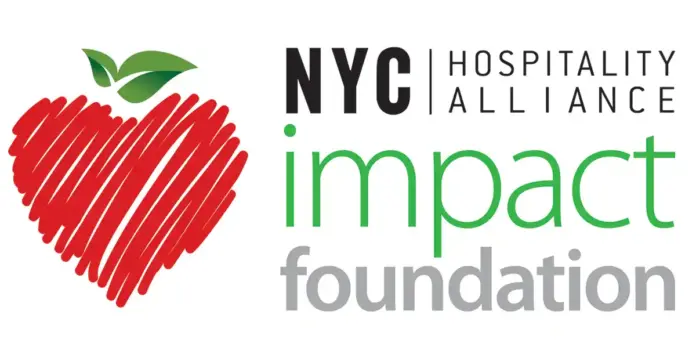
Workforce development, emergency meals, and a scholarship fund are on the agenda for the newly created NYC Hospitality Alliance Impact Foundation
In March 2020, as the pandemic began to ravage the country and shelter-in orders forcing friends and neighbors indoors and restaurants to shutter, the city that never sleeps came to a sudden halt, silent but for the sounds of ambulance sirens wailing through the streets. With the restaurant industry seemingly decimated overnight, Andrew Rigie’s work was just beginning.

As president of the NYC Hospitality Alliance, Rigie has been a champion for the industry for the past 10 years, advocating for restaurant and nightlife communities in the halls of city and state government. During COVID, he and the Hospitality Alliance team nearly single-handedly saved the restaurant industry, creating key life-line programs and successfully implementing legislation establishing Drinks-to-Go, Outdoor Dining and Open Streets, creating an amnesty program for fines, supporting the Paycheck Protection Program and the Restaurant Revitalization Fund, and so much more.
With the pandemic (hopefully) in the rear view mirror, Rigie might have taken a breather and continued to merely (wink wink) focus on the heavy lifting around government advocacy. But no, Rigie was not interested in a breather. He was not done. Instead, he decided to dig deeper into the problems faced by restaurants across New York City—lack of staff and trouble with diversity—and also the larger issue of food insecurity.
In late 2022, he founded the New York City Hospitality Alliance Impact Foundation, a new 501(c)(3) nonprofit organization devoted to supporting the restaurant and nightlight industry and the communities they serve in unprecedented ways. The overarching goal: make a major impact for good.
“The NYC Hospitality Alliance is a 501c6 trade organization that has always engaged in philanthropic activities outside of its direct mission of government advocacy and industry education,” said Rigie. “For years, we had discussed a complimentary 501c3 nonprofit to be able to enhance the impact that we make and better serve our communities. With this new nonprofit, we are determined to make an impact in a more streamlined and transformative way.”
While the Impact Foundation is in its infancy, it has an impressive set of goals for its first year, focusing on three major issues plaguing the industry and its communities: staffing, diversity, and food insecurity.
Its first area of focus is to support a more diverse and inclusive workforce, bringing more BIPOC communities into restaurants in front and back of the house, and to supporting their growth and development. The Impact Foundation has already begun this work, making its first $25,000 grant to the Food Education Fund which grants culinary school scholarships to marginalized, low-income and BIPOC high school students.
The Impact Foundation is also working to support workforce development and stem the staffing crisis that has crushed the industry since the pandemic. According to a 2022 survey by the National Restaurant Association, seven of 10 operators reported not having enough employees to support demand at their restaurants and the majority said they don’t anticipate the labor situation to improve in 2022. As of Q1 2023, New York City’s restaurants and bars employ 35,000 fewer people compared to pre-pandemic employment levels in 2020.
What’s more, according to one POS survey, 51% of restaurant operators name staffing as a top challenge to success, while 35% say training staff is a top challenge. Turnover in the restaurant industry is at an all time high, at 75%, and it can cost $2,000 to hire and train a new staff member, and $15,000 to hire and train a new manager, costs that can significantly impact a small businesses bottom line and ability to survive, let alone thrive.
For Rigie, the long term health of the industry hinges on empowering more folks to join the ranks of the hospitality industry. To help create more opportunity for jobs, the Impact Foundation plans to make a first year $25,000 grant to fund high-quality hospitality industry training for New Yorkers in their first jobs in the restaurant industry. The Impact Foundation will also fund programs that “upskill” — training a server to become a manager, training a manager in human resources, budgeting and financial management, and more.
Rigie was inspired to pursue this sort of workforce development by a program piloted a few years ago during the opening of The Rockaway Hotel in Queens. But the owners of the hotel, themselves longtime Rockaway residents, were not tone-deaf to opening a boutique hotel complete with luxurious pool, private cabanas, and a restaurant peddling oyster towers in a neighborhood with the 13th-lowest median household income among the City’s 55 neighborhoods ($44,400), and the second-lowest in Queens.
The team not only committed to hiring at least 100 workers from the area, they implemented their signature “Hospitality Way” curriculum, an innovative and free 5-week job-training program to introduce local residents to the business of restaurants and hotels. The program culminated in a job fair that gave many students jobs they still hold today in the hospitality sector. “The program at the Rockaway Hotel is an impressive model of workforce development that taps into a community and truly transforms lives,” said Rigie. “We hope to be able to scale this pilot so that it can make a bigger impact on communities across the city.”
Rigie’s final area of focus (for now) is food insecurity. “Whether 9/11, Superstorm Sandy, COVID-19, floods in Queens, or fires in the Bronx, the city’s hospitality industry regularly provides meals, labor, and monetary support to New Yorkers in the wake of disasters,” said Rigie. “The pandemic laid bare the razor thin line separating many families from food insecurity and the ways in which emergency feeding disaster response is underfunded.”
Rigie intends to use the Impact Foundation to create a more streamlined response to disaster-feeding, funding restaurants to cook and serve their communities in times of crisis. The Impact Foundation has already carved out $25,000 to support emergency feeding, and will make a $5000 per borough grant to local community agencies working to stem food insecurity. The Impact Foundation’s Emergency Meals fund will also support seasonal food donations like Thanksgiving Turkey Drives, Holiday Meals, and the like.
“This $25,000 emergency meals allocation is just the beginning,” said Rigie. “We hope to establish and strengthen new relationships with local community leaders and outreach organizations in each borough doing this work to help amplify their work.
Looking ahead, Rigie hopes that the Impact Foundation can make a meaningful difference to the restaurant industry and the dedicated people that make up its workforce. “We are using this first year to show proof of concept,” he said. “We hope to make an impact in these three areas and then plan on scaling up and raising more money to increase annual grants and giving in the future.”
To make a donation to the Impact Foundation and to learn more please visit the website. On Instagram, follow the Alliance here, and the Impact Foundation here.
NYC Hospitality Alliance Impact Foundation Board of Advisors:
| Alfredo Angueira, Hoodspitality Group |
Andrew Walcott, Fusion East NY |
Jennifer McMahon Elliott, Great Performances | Michael Brady, Bar 47 |
| Andrew Rigie, NYC Hospitality Alliance |
Dhruv Chopra, Elsewhere |
Liz Murray, Marlow Collective |
Terence Tubridy, In Good Company |
| Andrea Strong, Journalist and Advocate |
Jeffrey Bank, Alicart Restaurant Group |
Melba Wilson, Melba’s Restaurant |























